七年级英语下册Unit 8 Pets Reading 教学案新版牛津版
- 格式:doc
- 大小:117.50 KB
- 文档页数:4
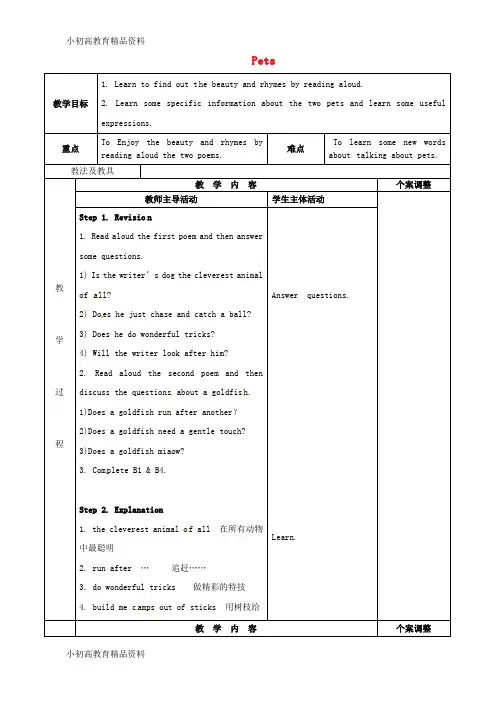
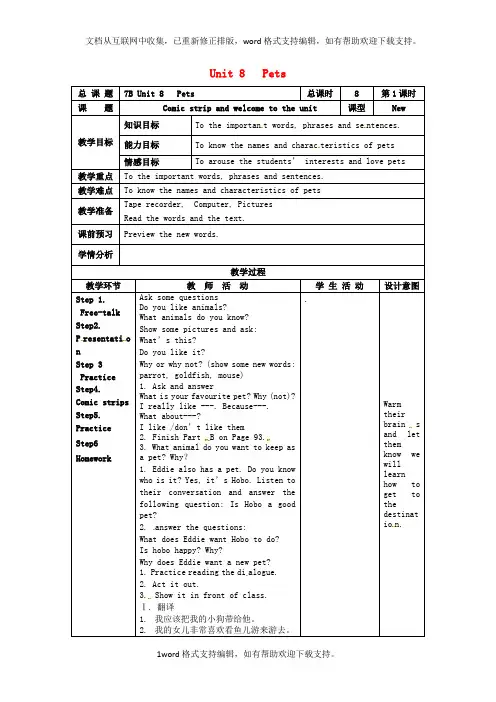
Unit 8 Pets总课题7B Unit 8 Pets 总课时8 第1课时课题Comic strip and welcome to the unit 课型New教学目标知识目标To the importan t words, phrases and se ntences. 能力目标To know the names and charac teristics of pets 情感目标To arouse the students’ interests a nd love pets教学重点To the important words, phrases and sentences. 教学难点To know the names and characteristics of pets教学准备Tape recorder, Computer, Pictures Read the words and the text.课前预习Preview the new words.学情分析教学过程教学环节教师活动学生活动设计意图Step 1.Free-talk Step2.P resentati o nStep 3Practice Step4. Comic strips Step5. Practice Step6 Homework Ask some questionsDo you like animals?What animals do you know?Show some pictures and ask:What’s this?Do you like it?Why or why not? (show some new words:parrot, goldfish, mouse)1. Ask and answerWhat is your favourite pet? Why (not)?I really like ---. Because---.What about---?I like /don’t like them2. Finish Part B on Page 93.3. What animal do you want to keep asa pet? Why?1. Eddie also has a pet. Do you knowwho is it? Yes, it’s Hobo. Listen totheir conversation and answer thefollowing question: Is Hobo a goodpet?2. answer the questions:What does Eddie want Hobo to do?Is hobo happy? Why?Why does Eddie want a new pet?1. Practice reading the di alogue.2. Act it out.3. Show it in front of class.Ⅰ. 翻译1.我应该把我的小狗带给他。
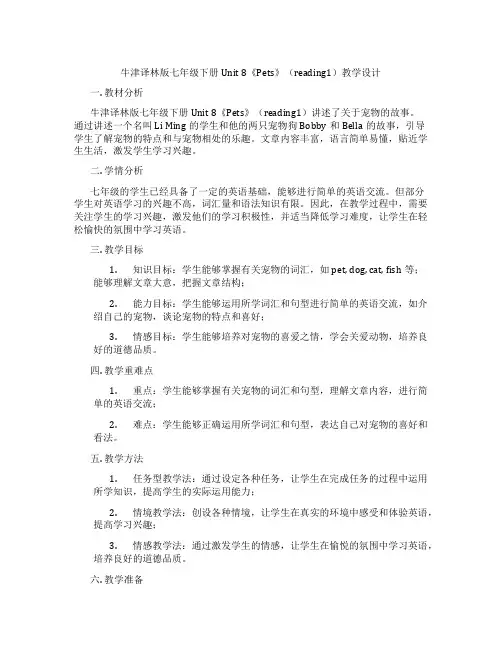
牛津译林版七年级下册Unit 8《Pets》(reading1)教学设计一. 教材分析牛津译林版七年级下册Unit 8《Pets》(reading1)讲述了关于宠物的故事。
通过讲述一个名叫Li Ming的学生和他的两只宠物狗Bobby和Bella的故事,引导学生了解宠物的特点和与宠物相处的乐趣。
文章内容丰富,语言简单易懂,贴近学生生活,激发学生学习兴趣。
二. 学情分析七年级的学生已经具备了一定的英语基础,能够进行简单的英语交流。
但部分学生对英语学习的兴趣不高,词汇量和语法知识有限。
因此,在教学过程中,需要关注学生的学习兴趣,激发他们的学习积极性,并适当降低学习难度,让学生在轻松愉快的氛围中学习英语。
三. 教学目标1.知识目标:学生能够掌握有关宠物的词汇,如pet, dog, cat, fish等;能够理解文章大意,把握文章结构;2.能力目标:学生能够运用所学词汇和句型进行简单的英语交流,如介绍自己的宠物,谈论宠物的特点和喜好;3.情感目标:学生能够培养对宠物的喜爱之情,学会关爱动物,培养良好的道德品质。
四. 教学重难点1.重点:学生能够掌握有关宠物的词汇和句型,理解文章内容,进行简单的英语交流;2.难点:学生能够正确运用所学词汇和句型,表达自己对宠物的喜好和看法。
五. 教学方法1.任务型教学法:通过设定各种任务,让学生在完成任务的过程中运用所学知识,提高学生的实际运用能力;2.情境教学法:创设各种情境,让学生在真实的环境中感受和体验英语,提高学习兴趣;3.情感教学法:通过激发学生的情感,让学生在愉悦的氛围中学习英语,培养良好的道德品质。
六. 教学准备1.准备相关宠物图片,用于教学展示和练习;2.准备宠物视频,用于导入和拓展环节;3.准备录音机和磁带,用于听力练习;4.准备单词卡片,用于单词学习和操练;5.准备课文课件,用于呈现和讲解。
七. 教学过程1.导入(5分钟)利用宠物视频引入课题,激发学生兴趣。
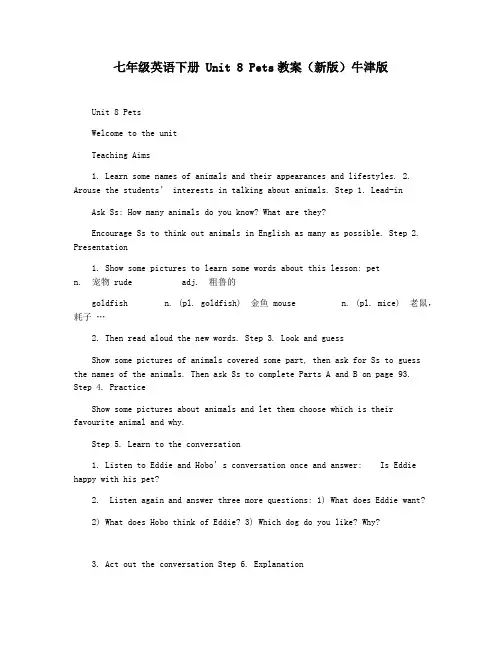
七年级英语下册 Unit 8 Pets教案(新版)牛津版Unit 8 PetsWelcome to the unitTeaching Aims1. Learn some names of animals and their appearances and lifestyles.2. Arouse the students’ interests in talking about animals. Step 1. Lead-inAsk Ss: How many animals do you know? What are they?Encourage Ss to think out animals in English as many as possible. Step 2. Presentation1. Show some pictures to learn some words about this lesson: pet n. 宠物 rude adj. 粗鲁的goldfish n. (pl. goldfish) 金鱼 mouse n. (pl. mice) 老鼠,耗子…2. Then read aloud the new words. Step3. Look and guessShow some pictures of animals covered some part, then ask for Ss to guess the names of the animals. Then ask Ss to complete Parts A and B on page 93. Step 4. PracticeShow some pictures about animals and let them choose which is theirfavourite animal and why.Step 5. Learn to the conversation1. Listen to Eddie and Hobo’s conversation once and an swer: Is Eddie happy with his pet?2. Listen again and answer three more questions: 1) What does Eddie want?2) What does Hobo think of Eddie? 3) Which dog do you like? Why?3. Act out the conversation Step 6. Explanation1. bring sb. sth. = bring sth. to sb. 给某人拿来某物Will you please bring me some dog food? take sth. to sb. 把某物带(去)给某人Jim will not come home for lunch today. Please take this lunch box to him.2. something to eat 一些吃的东西 something to drink 一些喝的东西注:something 常用于肯定句以及表示请求建议的问句中;而在否定句和疑问句中则要用anything。
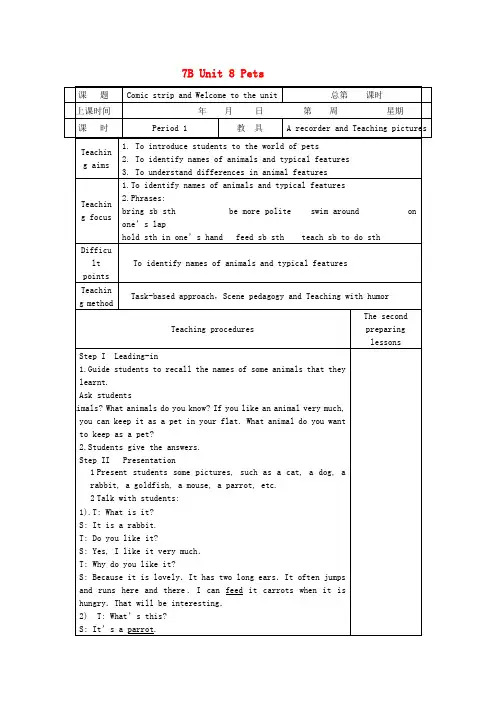
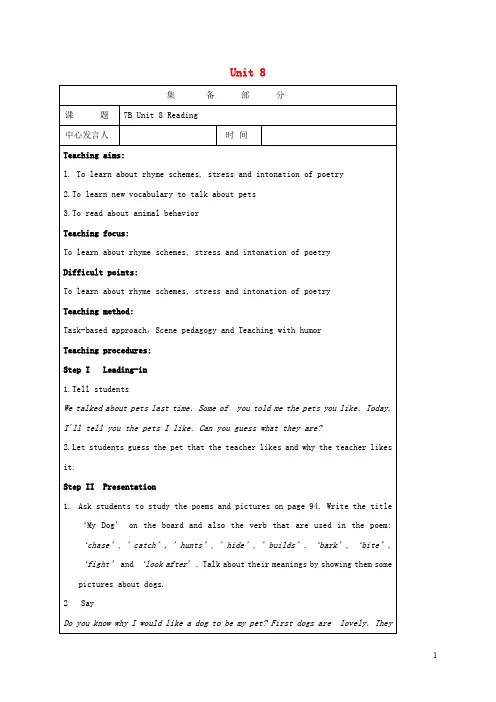
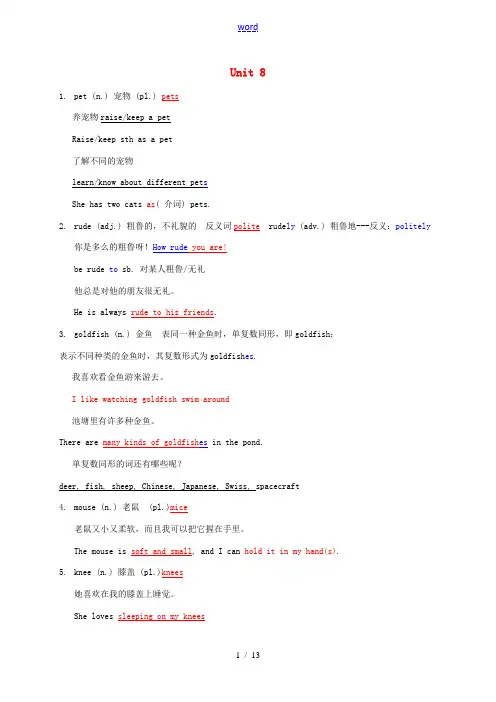
Unit 81.pet (n.) 宠物 (pl.) pets养宠物raise/keep a petRaise/keep sth as a pet了解不同的宠物learn/know about different pet sShe has two cats as( 介词) pets.2.rude (adj.) 粗鲁的,不礼貌的反义词polite rude ly (adv.) 粗鲁地---反义:politely你是多么的粗鲁呀!How rude you are!be rude to sb. 对某人粗鲁/无礼他总是对他的朋友很无礼。
He is always rude to his friends.3.goldfish (n.) 金鱼表同一种金鱼时,单复数同形,即goldfish;表示不同种类的金鱼时,其复数形式为goldfish es.我喜欢看金鱼游来游去。
I like watching goldfish swim around池塘里有许多种金鱼。
There are many kinds of goldfish es in the pond.单复数同形的词还有哪些呢?deer, fish, sheep, Chinese, Japanese, Swiss, spacecraft4.mouse (n.) 老鼠 (pl.)mice老鼠又小又柔软,而且我可以把它握在手里。
The mouse is soft and small, and I can hold it in my hand(s).5.knee (n.) 膝盖 (pl.)knees她喜欢在我的膝盖上睡觉。
She loves sleeping on my knees6.hold (vt.)三单现holds过去式held现在分词holding(1)握着,拿她手里正拿着一本书。
She is holding a book in her hand(2)举行上周我们举行了一场运动会。
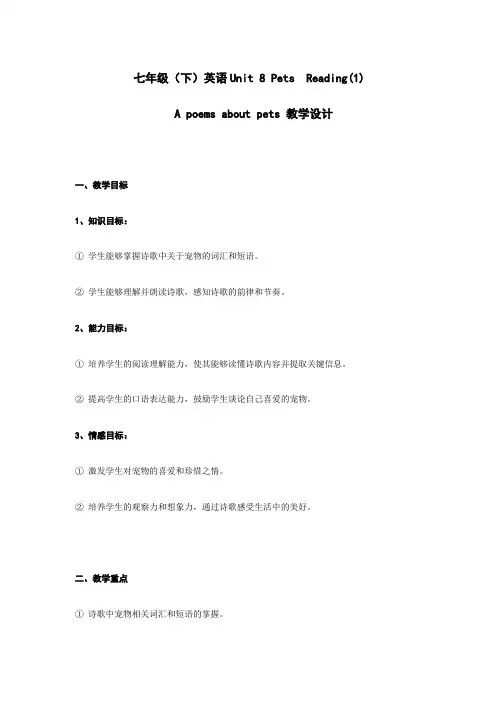
七年级(下)英语Unit 8 Pets Reading(1)A poems about pets 教学设计_______________________________________________________________________________一、教学目标1、知识目标:①学生能够掌握诗歌中关于宠物的词汇和短语。
②学生能够理解并朗读诗歌,感知诗歌的韵律和节奏。
2、能力目标:①培养学生的阅读理解能力,使其能够读懂诗歌内容并提取关键信息。
②提高学生的口语表达能力,鼓励学生谈论自己喜爱的宠物。
3、情感目标:①激发学生对宠物的喜爱和珍惜之情。
②培养学生的观察力和想象力,通过诗歌感受生活中的美好。
_______________________________________________________________________________ 二、教学重点①诗歌中宠物相关词汇和短语的掌握。
②诗歌内容的理解和朗读。
_______________________________________________________________________________ 三、教学难点①诗歌深层含义的理解。
②学生情感的激发和表达。
_______________________________________________________________________________ 四、教学过程Step1 Lead in①展示宠物图片,引导学生谈论自己喜爱的宠物及其特点。
②提问:你们觉得宠物给我们带来了什么?Step2 Presentation①呈现诗歌标题《A Poems about pets》,介绍诗歌背景和主题。
②朗读诗歌,让学生感受诗歌的韵律和节奏。
③讲解诗歌中的生词和短语,帮助学生理解诗歌内容。
Step3 Text Analysis①分段解析诗歌,讲解每段的主要内容和深层含义。
![[学习资料]七年级英语下册 Unit 8 Pets Reading 2教案 (新版)牛津版](https://uimg.taocdn.com/be0dfb59a98271fe910ef93c.webp)
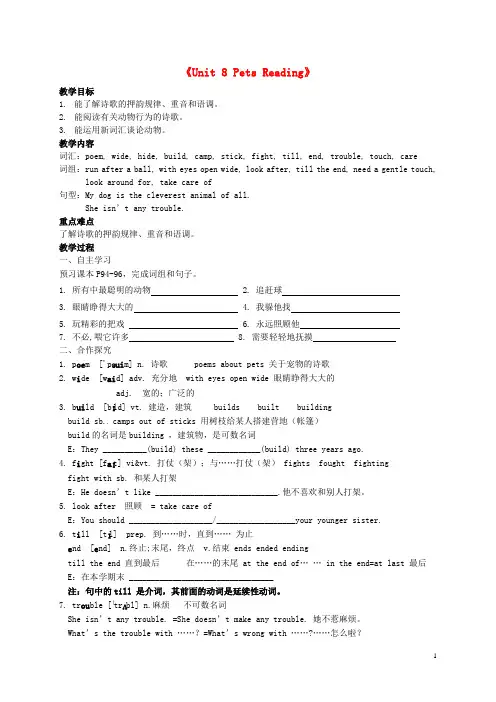
《Unit 8 Pets Reading》教学目标1.能了解诗歌的押韵规律、重音和语调。
2.能阅读有关动物行为的诗歌。
3.能运用新词汇谈论动物。
教学内容词汇:poem, wide, hide, build, camp, stick, fight, till, end, trouble, touch, care词组:run after a ball, with eyes open wide, look after, till the end, need a gentle touch, look around for, take care of句型:My dog is the cleverest animal of all.She isn’t any trouble.重点难点了解诗歌的押韵规律、重音和语调。
教学过程一、自主学习预习课本P94-96,完成词组和句子。
1. 所有中最聪明的动物2. 追赶球3. 眼睛睁得大大的4. 我躲他找5. 玩精彩的把戏6. 永远照顾他7. 不必,喂它许多 8. 需要轻轻地抚摸二、合作探究1. p oe m ['pəui m] n. 诗歌 poems about pets 关于宠物的诗歌2. w i de [w ai d] adv. 充分地 with eyes open wide 眼睛睁得大大的adj. 宽的;广泛的3. b ui ld [bɪld] vt. 建造,建筑 builds built buildingbuild sb. camps out of sticks 用树枝给某人搭建营地(帐篷)build的名词是building ,建筑物,是可数名词E:They __________(build) these ____________(build) three years ago.4. f i ght [f aɪt] vi&vt. 打仗(架);与……打仗(架) fights fought fightingfight with sb. 和某人打架E:He doesn’t like ____________________________.他不喜欢和别人打架。
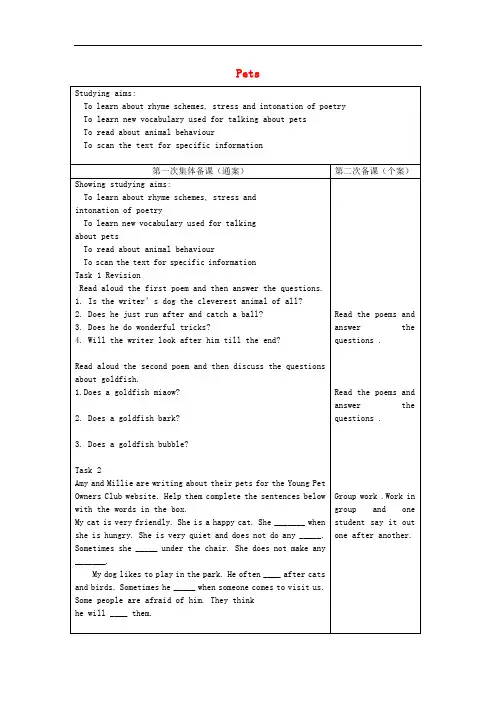
牛津译林版七年级下册Unit 8《Pets》(Reading II)教学设计一. 教材分析《Pets》是人教版牛津译林英语七年级下册Unit 8的一篇阅读文章,主要讲述了关于一只名叫“Lucky”的狗的故事。
文章内容简单有趣,插图生动可爱,能够激发学生的学习兴趣。
本文主要涉及到一些关于宠物的词汇和描述宠物特征的句型。
二. 学情分析七年级的学生已经掌握了基本的英语语法和词汇,对于描述动物的句子也有一定的理解能力。
但部分学生可能对宠物的了解不多,因此在教学中需要引导学生了解宠物,并能够运用英语进行描述。
三. 教学目标1.知识目标:学生能够掌握关于宠物的词汇,如cat, dog, fish等,以及描述宠物特征的句型,如“It has big eyes and a small nose.”2.能力目标:学生能够朗读并理解文章内容,能够运用所学句型描述一种宠物。
3.情感目标:培养学生热爱动物,关爱宠物的情感。
四. 教学重难点1.重点:掌握关于宠物的词汇和描述宠物特征的句型。
2.难点:能够正确运用所学句型描述一种宠物。
五. 教学方法1.任务型教学法:通过设置各种任务,让学生在实践中学习和运用英语。
2.情境教学法:创设各种情境,让学生在真实的环境中学习英语。
3.合作学习法:引导学生互相合作,共同完成学习任务。
六. 教学准备1.教材:人教版牛津译林英语七年级下册Unit 8《Pets》2.多媒体设备:电脑、投影仪、音响等3.教学素材:有关宠物的图片、视频等4.学习任务单七. 教学过程1.导入(5分钟)利用多媒体展示各种宠物的图片,引导学生谈论他们喜欢的宠物,并简要介绍宠物的特点。
2.呈现(10分钟)展示文章标题《Pets》,引导学生猜测文章内容。
然后播放文章配套录音,让学生初步感知文章内容。
3.操练(10分钟)学生跟读文章,注意模仿发音。
教师提问学生关于文章内容的问题,如“What is Lucky?”, “What does it look like?”等,检查学生对文章的理解。
《Unit 8 Pets Reading》教学目标1.能了解诗歌的押韵规律、重音和语调。
2.能阅读有关动物行为的诗歌。
3.能运用新词汇谈论动物。
教学内容词汇:poem, wide, hide, build, camp, stick, fight, till, end, trouble, touch, care词组:run after a ball, with eyes open wide, look after, till the end, need a gentle touch, look around for, take care of句型:My dog is the cleverest animal of all.She isn’t any trouble.重点难点了解诗歌的押韵规律、重音和语调。
教学过程一、自主学习预习课本P94-96,完成词组和句子。
1. 所有中最聪明的动物2. 追赶球3. 眼睛睁得大大的4. 我躲他找5. 玩精彩的把戏6. 永远照顾他7. 不必,喂它许多 8. 需要轻轻地抚摸二、合作探究1. p oe m ['pəui m] n. 诗歌 poems about pets 关于宠物的诗歌2. w i de [w ai d] adv. 充分地 with eyes open wide 眼睛睁得大大的adj. 宽的;广泛的3. b ui ld [bɪld] vt. 建造,建筑 builds built buildingbuild sb. camps out of sticks 用树枝给某人搭建营地(帐篷)build的名词是building ,建筑物,是可数名词E:They __________(build) these ____________(build) three years ago.4. f i ght [f aɪt] vi&vt. 打仗(架);与……打仗(架) fights fought fightingfight with sb. 和某人打架E:He doesn’t like ____________________________.他不喜欢和别人打架。
5. look after 照顾 = take care ofE:You should ___________________/__________________your younger sister.6. t i ll [tɪl] prep. 到……时,直到……为止e nd [e nd] n.终止;末尾,终点 v.结束 ends ended endingtill the end 直到最后在……的末尾 at the end of…… in the end=at last 最后E:在本学期末 _________________________________注:句中的till 是介词,其前面的动词是延续性动词。
7. tr ou ble [ˈtrʌbl] n.麻烦不可数名词She isn’t any trouble. =She doesn’t make any trouble. 她不惹麻烦。
What’s the trouble with ……?=What’s wrong with ……?……怎么啦?8. t ouch [tʌtʃ] n.&v触摸,碰 touche s touching touchedShe doesn’t need a gentle touch.. 她不需要温柔的抚摸。
Don’t touch the box. 别去碰这个盒子。
9.with his eyes o pen wide. 眼睛睁得大大的with +名称+形容词/介词短语表示伴随状态He looks at so much money ____________________.眼睛睁得大大的1010. the cleverest animal of all所有动物中最聪明的cleverest 是clever的最高级,最高级前一般要加the ,有修饰词时省略theEg: my best friend三、巩固提升(1)、用所给动词的适当形式填空。
1. My dog never _________ (worry) because we take good care of her.2. If you love Beijing Opera, why not _________ (visit) our local theatre?3. Don’t make any noise. My mother ________ (sleep) in the next room.4. The robbers tried to run away but the police _____ (catch) them in the end.5. I hear our teacher _________ (return) from Nanjing in a week.6. Last night I heard someone _________ (shout) “Fire! Fire!”.7. Can you tell me when __________ (have) a meeting?8. It’s necessary (clean) the fish tank every day.9. You should practise _________ (speak) English often after class.10. She wants ___________ (keep) a pet.(2)、单项选择。
()1.My grandpa has poor eyesight. He has some trouble _______books without glasses.A. readB. readingC. to readD. to reading()2. I looked for my pen _______, but I can’t find it_________.A. everywhere; anywhereB. anywhere; everywhereC. somewhere; everywhereD. everywhe re; somewhere.()3. Nobody ______about the price.A. careB. carefulC. caresD. carefully()4. Tom fights _______his brother_______ food sometimes .A. for, forB. with, withC. with, forD. for, with()5. He ________ finish his homework __________ his Dad came back.A. not; untilB. didn’t; untilC. won’t; beforeD. isn’t; after ()6. Who is ____________ student ____________ your class.A. cleverest; ofB. the cleverest; inC. clever; inD. more cleverer; of()7.---Where is Mr. Wu, do you know?---Well, it’s hard to say. But I saw him ______ a football game just now.A. was watchingB. watchingC. had watchedD. watched()8. Mary runs ______ of all the girls in her school and she won the 100-meter race last month.A. fastes tB. slowestC. nearestD. highest()9. ---______ I return the MP3 player to you today, Tinna?---No, you needn’t. Tomorrow is OK.A. ShallB. MustC. WillD. Can()10. –-What’s your problem? ---I have trouble ______ these words in English.A. talkingB. sayingC. tellingD. speaking (3)、句型转换。
1. I will look after the dog till the end. (改同义句)I will the dog.2. Cats sleep on top of pianos. (对划线部分提问).__________ __________ cats _____________?3. You mustn’t speak to the little child like that. (改为祈使句)_________ _________ _________ the little child like that.4. Tom always exercises and works. (改否定句)Tom .(4)、阅读理解。
Here is our pet. Mr. Hawkeye is seven years old, and we got him from our vet (兽医). He takes in a lot of cats. Hawkeye is one of the eight cats at our home but is a real character. He receives his name because he is such a hawk(掠夺者) around food. If you are not looking, he will take a sandwich off your plate. He can smell the delicious food in the fridge from another floor in the house, and potato chi ps are his favourite thing to steal! This comes the name, Haw keye. Hawkeye was a great animal at the vet. They thought he could bring good luck and he took care of all the new cats, giving them baths, etc. He does that at our house as well. Like I said, he is quite a character and very friendly. He always greets us when we come home. He has to check out all the bags to make sure if there’s food there for him----especially chips!( ) 1. Mr. Hawkeye is _________.A. our pet dogB. the owner of the petC. a catD. a vet( ) 2. He receives his name Hawkeye because _________.A. he is a hawkB. he can bring good luckC. he is a real characterD. he i s quick at getting food ( ) 3. Our pet likes ________ best of all.A. sandwichesB. potato chipsC. potatoesD. new cats ( ) 4. The underlined word “character” mostly means________ here.A. 有个性的宠物B. 有个性的人C. 主角D. 英雄( ) 5. What do you think of Mr. Hawkeye?A. He is very clever and friendly.B. He is very lucky.C. He is a very good vet.D. He can do all the housework at home.(5)首字母填空A couple (夫妻) have a son and a daughter, and they are twins (双胞胎). They live in a q__1____ village in Yancheng. Their house is very small with only three rooms. The twins don’t have a s__2_____. They have to do their homework in the living room. They have no washing m____3____ to wash clothes, and no f___4____ to keep food in.The twins are in the n___5___grade this year. Every morning, they s___6____ a bike to go to school. And when they are back from school, they do a lot of housework for their parents. They live a hard life. But the family is always full __7 fun. They often sit on their old sofa and chat about the children’s f__8___ dreams and plans. The family is poor, but it is famous in Yancheng now. Because it g__9____2, 000 yuan to other poor children last year. When people ask them why they are so generous (慷慨的), the father always says, “Weknow h___10___ people feel when their children can’t go to school.”1._______2._______3._________4._______5.__________6. __________7. __________8. __________9. __________ 10. __________。